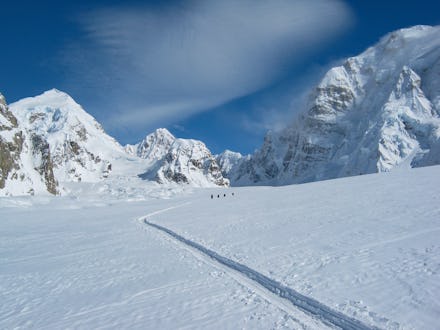There was an "ice quake" in Alaska last night, thanks to this record-breaking heat wave

The ongoing heat wave that is plaguing the Pacific Northwest and melting everything from roads to mountains has made its way up to Alaska, and it's bringing with it a unique form of environmental destruction. As abnormally high temperatures invaded the state, glaciers started to melt, causing a phenomenon known terrifyingly as an ice quake.
According to the U.S. Geological Survey, a 2.7 magnitude ice quake — a non-tectonic seismic event significant enough to register on the Richter scale — shook the ground in the Alaska Panhandle, about 25 miles out from Alaska's capital city of Juneau, at around 5:29 a.m. local time Tuesday. That earth-shaking event, which was recorded at a depth of about 8 miles below the surface, couldn't be felt at ground level. But the fact that this is happening at all is enough to shake all of us to the core.
The event, known as a glacial cryoseism, is typically the result of rapid changes in temperatures. It's not at all uncommon for ice quakes to take place over the course of winter months in Alaska and other chilly regions. According to a 2016 report in Weatherwise, these events happen "when the surface temperature undergoes a rapid cooling from above freezing to near subzero." They can also occur from unexpected heat, as appears to be the cause of Tuesday's below-surface quake. As unseasonably warm weather made its way across Alaska, glaciers started to melt, creating cracks that can cause large chunks of the dense ice to break off. This can have some dramatic effects, as the land below glaciers often shifts based on the weight of the icy mass on top of it. When the glacier melts, or an entire hunk of it falls off, it can cause the land to rise, creating faults that are often felt as a seismic event.
That pretty much checks out with what is happening in Alaska right now. The heat dome that has been hanging above the Pacific Northwest for days now is bringing record-breaking temperatures to Alaska too. Parts of the state recorded temperatures as high as 92 degrees — well above the seasonal averages for June, which usually brings high temperatures in the mid-60s around this time of year. That heat is taking its toll, putting unexpected pressure on glaciers and snow that wouldn't otherwise be exposed to these types of temperatures.
The glaciers aren't the only ones struggling with the heat. Streetcar service in Portland was forced to shut down because the heat started to melt power cables, Seattle roads started to crack as record-high temperatures cooked the concrete, and melting snow on Canadian mountaintops has created flood risks for nearby towns.
These types of things are not supposed to be happening. We no longer live on the planet we used to — it's changing, and fast, thanks to human activity. We can either curb our behavior to try to limit these kinds of events, or be forced to live with the fallout.